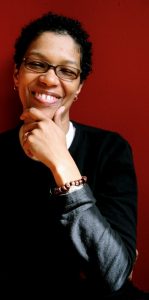
The Rev. angel Kyodo williams believes that addressing racism in the United States can lead to the sense of belonging the American dream promised, but never fully delivered on.
A multiracial, black and queer Zen Buddhist teacher, williams said those intersections of race, religion and culture, in some ways, are what have brought her to Chautauqua.
“People hear I’m Buddhist, and suddenly I’m a foreigner,” said williams, an author, activist and ordained Zen priest. “I’m American; and like every American that grew up in New York, I’m also deeply steeped in Judaism, certainly in cultural Judaism. So I think that sitting at these intersections gives me access to a wide array of sensibilities and experiences that allows me to touch on many different aspects of what is impacting all of us.”
At 2 p.m. Tuesday, August 20 in the Hall of Philosophy, williams will untangle “Race in America: Myths, Madness, Redemption & Belonging,” as part of the Week Nine interfaith lecture series, “Exploring Race, Religion, and Culture.”
“My particular focus is liberation from things that hinder us from seeing reality as it is,” williams said. “And there is nothing more obscuring of being awake to the nature of reality as it is, at this particular time, than the things that many of us had hoped were at least receding into the past. Race is one of those things.”
According to williams, people tend to only think about race in a way that focuses on people of color, and the problems it causes for them.
“Racism was built to police white people,” she said. “We don’t think about that in that way. My journey into all this was to realize that Western Buddhist communities here in the (United States) and in the West in general, are largely and overwhelmingly white. I realized that the question of race was not being dealt with at all.”
Ignoring that fact was “socially convenient” for these communities, williams said.
“It was socially convenient for them to not pay attention to the collective impact, but it was also keeping them from their personal liberation, as well,” she said. “If you walk into a room and someone doesn’t register you as a human being of equal value, that means that thing is fundamentally diminishing your humanity and human capacity.”
While she’s only the second black woman to be recognized as a teacher in the Japanese Zen lineage, williams said people shouldn’t be surprised at the lack of representation in Japanese Zen.
“It’s not just that black people aren’t in Japanese Zen — they’re not in Vietnamese Zen, they’re not in Chicano or indigenous culture,” she said. “White people are everywhere, taking everything everywhere they go. That’s entitlement. It finally occurred to me that we always ask why we’re not represented. The question actually is, ‘Why are white people so represented everywhere?’ ”
In 2016, williams co-authored Radical Dharma: Talking Race, Love, and Liberation along with Lama Rod Owens and Jasmine Syedullah.
“We have done a lot of advocating about race, but we’ve never really had a national conversation about race,” she said.
In response to the absence of that national conversation, williams and her co-authors held four conversations in different locations across the country.
“It was born out of the idea that we need a national conversation about race,” williams said.
The pattern of problems concerning race in the United States is cyclical, according to williams.
“Here we are again, right?” she said. “I think that this time is really our time. We know enough. We have intersectionality and relationships across different lines. Through the vast network of love, we have the tools to put this myth to rest, and begin our journey towards becoming the America that was promised.”




